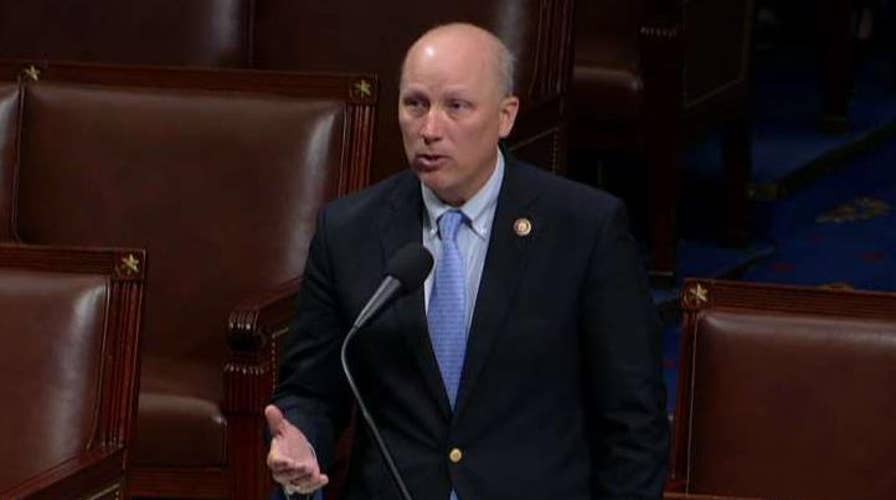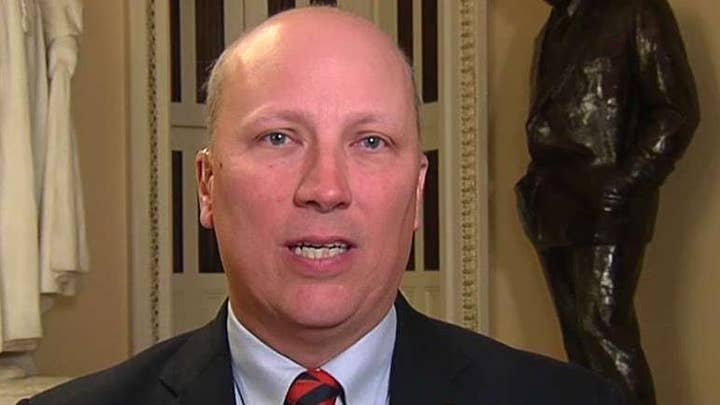Lone GOP congressman stalls $19 billion disaster aid bill
Texas Republican Rep. Chip Roy's solitary objection delays the vote on a disaster relief bill.
There is an old expression in Washington that nothing is decided until everything is decided.
Well, consider the state of the $19.1 billion disaster bill.
It took a Herculean effort to pry that package loose Thursday in the Senate, triggering an overwhelming, 85-8 vote. President Trump signaled to Senate Appropriations Committee Chairman Richard Shelby, R-Ala., and Sen. David Perdue, R-Ga., that he would sign the package – even without provisions for the border. The senators say the President indicated the disaster money was too important and had been stalled too long. States in the south and Midwest – stricken by hurricanes and flooding – could wait no longer.
That’s until Rep. Chip Roy, R-Texas, torpedoed everything Friday morning.
There are three ways the House and Senate can approve bills. They can conduct a standard roll call vote, where everyone either casts ballots as yea or nay. The House and Senate can hold a “voice vote.” That’s where everyone either hollers yea or nay. The loudest side is supposed to win.
However, the lawmaker who is presiding always declares “in the opinion of the chair, the ayes have it” or “the noes have it.” But, if the losing side doesn’t like the outcome, they can always demand a recorded vote. Finally, there is “unanimous consent.” That’s where all 435 or 100 people must agree. All it takes is a solitary objection, even if everyone else wants to do something else. Lodging an objection stops everything.
LONE GOP REP BLOCKS DISASTER AID BILL IN SURPRISE MOVE
It is said you can make the sun rise in the west if you obtain unanimous consent.
This is where Roy comes in.
There were only three House members on the floor Friday when the House tried to advance the disaster aid measure by unanimous consent and sync up with the Senate. Rep. Jim McGovern, D-Mass., presided over the session. Rep. Donna Shalala, D-Fla., was on the floor to make the unanimous consent request. And then there was Roy.
Those in favor of the measure outnumbered Roy two one.
Unanimous consent is powerful - but hard to obtain. There’s only one reason Roy showed up Friday morning as the House attempted to approve the measure with a skeleton staff on hand. Passing the package by unanimous consent would mean the House and Senate were in alignment, having okayed the same package. The measure would then be ready for President Trump’s signature.
House Minority Leader Kevin McCarthy, R-Calif., implored Democratic leaders to keep the House in session on Thursday to approve the disaster aid measure. But the House wasn’t going to budge until the Senate acted. Most House members jetted out of Washington midday Thursday for a week-and-a-half, starting the Memorial Day recess.
It was unclear until early Thursday afternoon as to the fate of the disaster package. Senate Majority Leader Mitch McConnell, R-Ky., warned his colleagues the Senate would vote “on something” on disaster aid and “not adjourn.” The Senate pondered re-voting a sidetracked version of disaster aid which fell apart in early April. But the Senate was set to vote on a retooled plan once President Trump signaled he would sign the measure – even without the border provisions. Things came together very quickly in the Senate. But the House was long gone.
One may ask whether it would have been worthwhile to keep the House in session just to see if the Senate would act. Of course, there’s always grandstanding from lawmakers about such efforts. Lawmakers regularly trumpet why Congress should remain in session over a recess or a weekend to try to fix one issue or another. Those are often the same lawmakers who have a cab idling just outside the Capitol, ready to whisk them across the river to make a flight at Reagan National Airport.
The Memorial Day recess is particularly problematic for scheduling. Many members have big overseas work trips planned. A number of lawmakers are expected to go to Normandy, France in a few days for the 75th anniversary of D-Day. That’s to say nothing of lawmakers who are jetting back to their states and districts to participate in Memorial Day parades and visit cemeteries.
Tethering lawmakers to Washington for a day or two, without a clear idea that a consequential vote is coming presents a problem. Yes, the Senate approved the disaster bill just after the House abandoned Washington. But it was far from clear that senators would do that Thursday.
So, the disaster measure is now stalled. Again.
Roy chatted briefly with Shalala on the House floor just before the session started Friday morning.
“He came up to graciously inform me he was going to object because he wanted the President’s border request to be included,” said Shalala. “This is not the way our government should work. We’re ready to work in the House in a bipartisan way. The same as the Senate was ready to go. One individual. His position is irresponsible.”
Shalala characterized the turn of events as “tragic.” She worried about the additional delay for families trying to recover.
“Why should they have to wait a week longer because some member of Congress objects?” asked the Florida Democrat.
Of course, the question is whether Roy simply delayed the inevitable. But the House won’t return to full action until June 4. The House appears to have the votes to pass the plan in bipartisan fashion.
“This, is respectfully, swamp-speak. Delaying the inevitable. It’s the inevitability of DC. The inevitability of spending where we don’t speak up and voice the concerns that I hear when I go back to every town in Texas 21,” said Roy. “Why aren’t we addressing disaster spending in a way that is fiscally responsible? We just keep writing checks.”
Roy got an earful from Florida Agriculture Commissioner Nikki Fried.
“It’s craven, shameful politics at its worst that a single House member would choose to further delay disaster relief,” protested Fried. “Congressman Roy must have forgotten the aid that Texans received after hurricane Harvey.”
But is passage of the bill inevitable? Simply delayed?
SENATE PASSES DISASTER AID BILL
It is said that house guests and fish start to smell after three days. Consider the controversy which stymied this disaster package. Republicans tried to infuse the bill with presidential politics. They argued Senate Democrats running for President should vote yes – or face trouble in sodden Iowa ahead of the caucuses. Republicans contended Democrats played politics with Puerto Rico money. There were questions about what a stunted disaster bill would mean for Sens. Joni Ernst, R-Iowa, Ben Sasse, R-Neb., John Cornyn, R-Texas, and Perdue. All face re-election bids in states desperate for disaster assistance. All could face competitive races. Ernst is in a battleground state. Texas and Georgia are trending slightly toward Democrats. Then there were issues about adding humanitarian provisions for the border. Are things settled with this legislation? Or, will another impediment possibly expose the bill to political enzymes, ready to foul the legislation?
“I am not looking for a way to erode support for something,” said Roy when asked about letting the legislation bake in the parliamentary elements for more than a week. “This legislation should be offset. This legislation should include border funding so we can deal with that crisis.”
But the bill may not have to wait a week.
Only a few House members will linger around Washington for the next 11 days. The House is scheduled to meet briefly at 2 pm on Tuesday, May 28 and at 4:30 pm on Thursday, May 30. House Majority Leader Steny Hoyer, D-Md., intimated that “we will take action as early as next week when the House meets again during pro forma.”
CLICK HERE TO GET THE FOX NEWS APP
That’s a reference to those short sessions. The House could again attempt to marshal unanimous consent to pass the disaster aid bill without a roll call vote. This is a ploy by Democrats to dare Roy or other Republicans to object again. Then Democrats can portray them as obstructionists who are trying to delay disaster assistance.
This could all backfire on Roy and other GOPers. If they don’t object, then the bill passes and the protestations fall by the wayside. If they do block the bill a second or a third time, then Democrats can easily make the case about Republican obstructionism.
Not a lot of people knew who Chip Roy was before today. But now they do. Democrats will pin a name and a face on the obstruction.
Then again, one senior Republican source told Fox “perhaps Roy wants it that way.”






